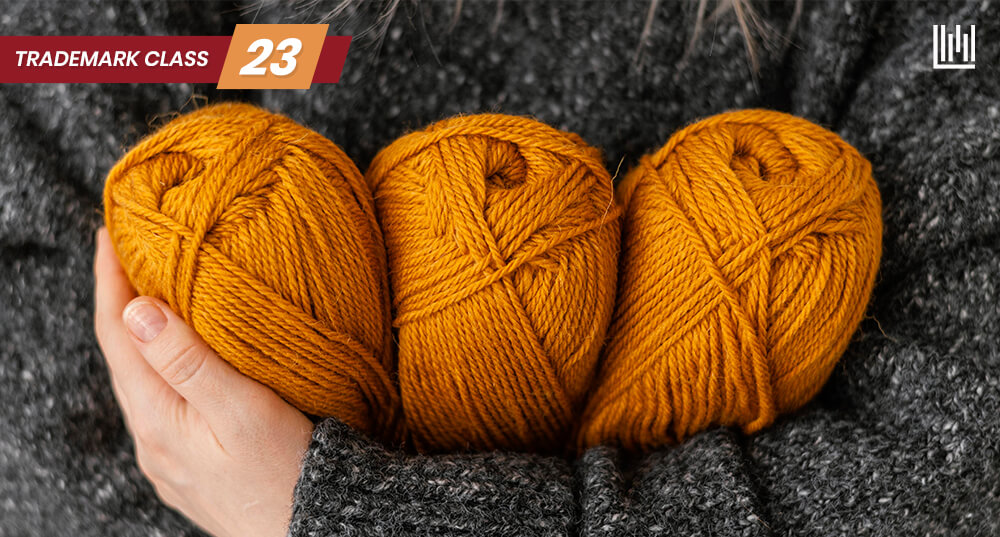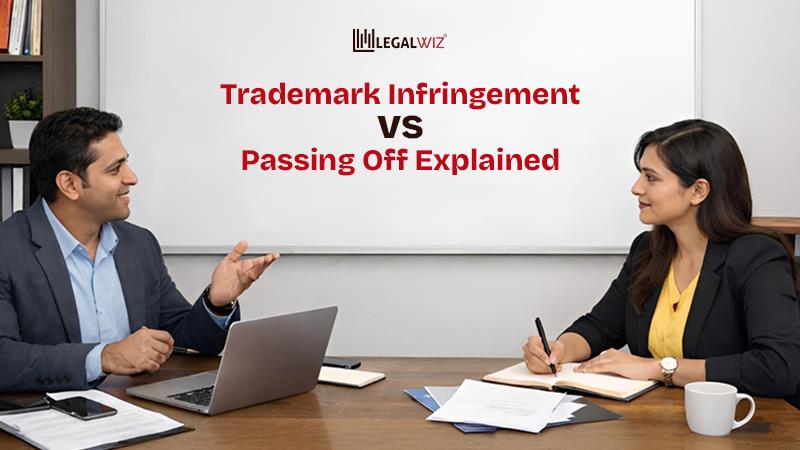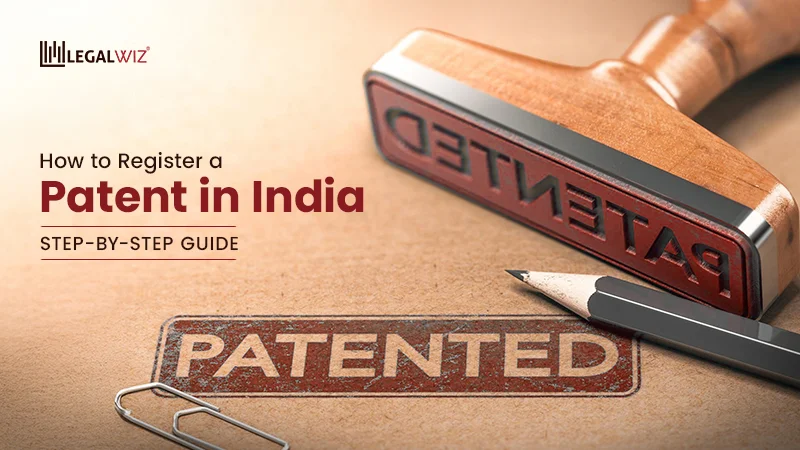Trademark Class 23: Yarns & Threads Used in Textiles
If your business involves yarns, threads, or filaments used in textile manufacturing, sewing, or embroidery, then Trademark Class 23 is where your brand belongs. This class applies to a wide range of natural, synthetic, and blended yarns and sewing threads used in commercial and domestic textile production.
Whether you’re a manufacturer of cotton yarns, polyester threads, or embroidery filaments, securing your brand through trademark registration under Class 23 ensures you’re protected in the textile supply chain—an industry where product reputation and consistency matter.
Let’s explore what’s included in Trademark Class 23, what’s not, and how to file for protection effectively.
Understanding Trademark Classification in India
In India, trademark registration is governed by the Trade Marks Act, 1999, which enables businesses to protect their unique brand elements, such as logos, product names, and slogans, associated with specific goods or services.
To streamline classification, India follows the Nice Classification system, an internationally recognized structure that divides all goods and services into 45 trademark classes—Classes 1 to 34 for goods and Classes 35 to 45 for services.
Trademark Class 23 is dedicated to yarns and threads used for textile purposes, including materials used in knitting, weaving, sewing, crocheting, and embroidery.
What Products Can You Trademark Under Class 23?
Trademark Class 23 covers a diverse range of thread and yarn-based products used across the textile value chain. From high-tensile sewing threads to colorful embroidery filaments, the class includes materials designed for durability, elasticity, aesthetic appeal, or industrial function.
Here’s a detailed list of what’s covered under Trademark Class 23
- Cotton yarns – Spun natural fiber threads used in weaving, knitting, or sewing lightweight fabrics.
- Wool and silk yarns – Fine yarns made from natural animal fibers used for luxury textiles and fashion apparel.
- Synthetic and blended yarns – Polyester, nylon, acrylic, and rayon yarns used for functional fabrics and sportswear.
- Elastic threads – Threads containing rubber or spandex used for stitching stretchable garments or waistbands.
- Embroidery threads – Decorative threads, including metallic and multicolor filaments, used in machine or hand embroidery.
- Sewing threads – Standard threads for industrial and domestic sewing applications, including core-spun and bonded threads.
- Linen, jute, and hemp yarns – Natural plant-based yarns used for eco-textile production, upholstery, or industrial fabric.
- Monofilament and multifilament threads – Fine synthetic threads used in special technical textiles and reinforced fabrics.
These products are used by textile manufacturers, garment exporters, embroidery houses, and fashion brands across India and beyond.
Explore the Complete List of Products Classified Under Trademark Class 23
Browse this simplified list to verify whether your yarns, sewing threads, or embroidery filaments are protected under Trademark Class 23.
Use the search function on your device to quickly locate your product by name and confirm its classification before filing your trademark application.
| Class | Term |
|---|
Looking for the right trademark class for your product? Check out our detailed article on choosing the appropriate class for trademark registration to identify the best fit for your product.
What Is Not Included in Trademark Class 23?
Although Trademark Class 23 covers a wide variety of yarns and threads used in textile production, some products are often confused and wrongly filed under this class. Misclassification can lead to weak protection or application rejection.
Here are some commonly confused items that do not fall under Class 23, with the correct class and reason:
- Textile fabrics and finished cloth materials are covered under the trademark class for fabrics and textiles (Class 24), as they represent the finished form of yarns, not raw input.
- Ready-made garments or apparel fall under the trademark class for clothing (Class 25), as they are end-use fashion products, not raw materials.
- Yarn manufacturing machinery or textile production equipment is registered under the trademark class for machines and tools (Class 7), since Class 23 only includes the materials, not the machinery used to process them.
- Dyes, chemicals, and textile treatment solutions fall under the trademark class for chemical products (Class 1), as they are used to treat or dye yarns but are not yarns themselves.
- Craft kits or hobby supplies containing yarns or threads are often filed under the toys and DIY kits trademark class (Class 28) if marketed as toys or DIY kits for children.
Determining the exact trademark class for your product can be tricky, especially when items overlap in function. If you’re unsure where your goods fit, use our Trademark Class Search Tool to find the right match and avoid rejection or delays.
Intellectual Properties You Should Trademark Under Class 23
If your business supplies raw textile materials like yarns, sewing threads, or decorative filaments, securing your intellectual property under Trademark Class 23 ensures you’re protected at the foundation of the textile and apparel manufacturing process.
Here’s what you should trademark:
- Company Name – Register your legal business identity (e.g., “FiberFirst Textiles Pvt. Ltd.”) to establish brand ownership across product lines.
- Brand Name – Secure product brands like “TexTwist,” “PolyWeave,” or “SilkLine” used on yarn spools, cones, or thread reels.
- Product Line or Collection Names – Trademark specific yarn collections such as “UltraCotton Threads” or “ArtEmbroidery Series.”
- Logos or Monograms – Protect any unique visual identity or graphic mark printed on packaging or tags.
- Slogans or Taglines – Phrases like “Woven with Precision” or “Threads that Last” can be trademarked for promotional use.
These protections ensure your products remain distinct and recognizable, whether sold through retailers, B2B distributors, or textile trade platforms.
List of Popular Brands Registered Under Class 23
Many renowned Indian and global textile supply brands have secured their trademarks under Trademark Class 23 to protect their product lines used in weaving, sewing, and embroidery.
Here are some examples:
- Vardhman Yarns – A leading Indian brand known for cotton and blended yarns used in weaving and knitting across global markets.
- Coats India – A globally recognized brand for industrial sewing threads and embroidery filaments, widely used in apparel and footwear.
- Sitaram Spinners – Manufacturers of cotton, viscose, and specialty yarns for both domestic and export markets.
- Winsome Yarns – Known for acrylic and blended yarns used in sportswear and knitwear.
- Modi Threads – Offers a wide range of polyester sewing threads for garments and home textiles.
- GTN Textiles – Specializes in high-quality combed and compact yarns for the fine fabric segment.
- Sujata Threads – Popular among local tailoring shops and small-scale garment producers for cost-effective polyester threads.
Why Register Your Trademark Under Class 23?
In the textile manufacturing industry, yarn and thread brands are closely associated with durability, quality, and consistency. Registering your brand under Trademark Class 23 ensures that your identity is protected in both domestic and international supply chains.
Key Benefits for Yarn & Thread Product Brands
- Exclusive Rights Over Brand Identity
Protect your product name, logo, and packaging design used across yarn cones, reels, or thread spools. - Defend Against Counterfeits and Copycats
Prevent others from using similar names or packaging that can confuse buyers or distributors. - Build Trust in B2B and OEM Markets
A registered trademark enhances brand credibility with apparel manufacturers, exporters, and industrial buyers. - Enable Seamless Expansion
Trademark protection supports future launches of new fiber blends, thread types, or product series under the same brand. - Strengthen IP Value and Licensing Potential
Your trademark becomes a valuable business asset that can be licensed, franchised, or monetized during business expansion.
If you’ve read this far, you likely know if your product falls under Class 23. If it does, now’s the perfect time to take the next step—apply for trademark registration today with expert guidance from LegalWiz.
Still evaluating your next steps? These resources will help you make an informed decision:
- When and why you should trademark a name
- What can be registered as a trademark
- Different types of trademarks in India
- Trademark registration fees and costs in India
- Documents Required for Trademark Registration in India
10,000+ Brands Trust LegalWiz.in for Trademark Protection
From cotton yarn manufacturers and industrial thread suppliers to embroidery thread brands and textile exporters, LegalWiz.in has helped thousands of Indian businesses protect their intellectual property under the correct trademark class.
Our team ensures that your Trademark Class 23 registration is filed with precision, avoiding costly classification errors and delays. Whether you’re supplying to local garment units or exporting globally, we help you protect your brand with confidence.
With a seamless 100% online process and dedicated legal support, LegalWiz.in is your trusted partner in securing your textile brand identity.
Why Choose LegalWiz.in for Your Trademark Registration?
If you’re a yarn manufacturer, thread supplier, or textile exporter, LegalWiz.in makes it easy to file your trademark under Class 23 with speed, clarity, and full legal support.
Here’s why textile businesses across India trust us:
- Correct Class Filing – Avoid rejection or weak protection with expert classification.
- 100% Online Process – Complete your trademark filing digitally from anywhere in India.
- Affordable & Transparent Pricing – No hidden fees, with fixed-cost plans for MSMEs and exporters.
- End-to-End Legal Support – From name availability checks to filing and handling objections.
- Pan-India Brand Trust – Serving businesses across manufacturing, fashion, and textile sectors.
Frequently Asked Questions
Are finished textiles or fabrics covered in Class 23?
No. Finished fabrics and cloth materials are classified under Trademark Class 24, not Class 23.
Can I register both sewing and embroidery threads under the same trademark?
Yes, as long as they fall under Class 23 and are part of the same brand or product line, a single registration can cover them.
What happens if I register my brand in the wrong class?
If you choose the wrong trademark class, your application may still get processed, but your trademark won’t be legally protected for the relevant goods or services. This means others could legally use a similar mark in that correct class, and you wouldn’t have grounds to stop them. Moreover, trademark fees are non-refundable, so you’d have to file a new application in the correct class and pay the fees again.
Can machinery or tools used for yarn production be registered in Class 23?
No, those fall under Trademark Class 7, which includes machines and industrial tools.
How long does registering a trademark take?
Trademark registration in India typically takes 6 months to 2 years, depending on any objections or third-party opposition. For a detailed overview of the process, read our complete guide on trademark registration process in India.
How long is my trademark valid, and how often should I renew it?
In India, a registered trademark is valid for 10 years. You must renew it every 10 years—either within 6 months before or after expiry—to maintain your rights.
Can I register a trademark before launching the product?
Yes, you can file based on intended use. You’ll need to show your bona fide intent to use the mark commercially.
Is my trademark valid across all classes automatically?
No. Trademark protection is limited to the class(es) you’ve registered for. If your product spans categories, register in multiple relevant classes.
What if someone infringes on my trademark?
Consult a trademark expert immediately. Legal remedies can include cease-and-desist notices or initiating infringement proceedings.

Amisha Shah
Amisha Shah heads content at LegalWiz.in, where she transforms complex legal concepts into clear, actionable insights. With extensive experience in legal, fintech, and business services, she helps startups and enterprises navigate regulatory challenges through engaging, accurate content that empowers informed business decisions.







